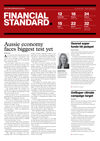Editor's Choice
UN pension chief joins Northern Trust
The head of the United Nations Joint Staff Pension Fund is taking on a new role at Northern Trust Asset Management.
Podcast: Exploring emerging markets and sustainability
Pablo Berrutti, senior portfolio specialist at Stewart Investors, discusses emerging market investment opportunities and their main growth drivers.
Carbon emission stabilisation 'reframes' investment climate risk: Emmi
Latest modelling from Emmi indicates carbon emissions may plateau within the next two years before gradually declining, signalling the first ever emission stabilisation outside of an economic crisis.
Hollywood heavyweights call on pension fund to divest fossil fuels
The likes of Sally Field, Mark Ruffalo and Jane Fonda are calling on the SAG-Producers Pension Plan to dump its holdings in oil and gas companies.


















Imposing a levy on imports that maintains CO@ emissions at local levels MUST include the emissions generated from inbound freight. Then we will some non-sensical product imports.
I imagine it would then kill off the proposal to import potatoes from Canada, for example.
As an employee in the manufacturing sector, I sense that industry is concerned at the downstream cost increases for energy consumption from a tax imposed on producers for CO2 emissions. Our operations in NSW incurred a 30% hike in electricity costs last year.
if a $20 a tonne levy is ever passed through to businesses buying electricity, it will push the cost up another 20%. In marginalising domestic manufacturing, has anyone considered balancing this domestic impost with penalties on energy intensive competitor imports?
Could we not impose an even playing field where importers are required to maintain CO2 emissions at the local level, without going into the territory of protectionism?
I think a lot of the anger being displayed throughout the national electorate is because the impost of a tax implies ONLY that business and consumers will use less fuel & electricity when the cost jumps a further 25%. Where are the pro-active policies for renewables, imports and alternates to balance this community cost?
I understand that electricity userd in NSW will be hit with 42% rises in charges over the next few years due to current infrastructure plans, on top of last year's 30% rise. Now we forsee government layering another 25% based on carbon dioxide emissions.
So the power cost doubles over 3-4 years.
How many businesses in NSW will consequently disappear?
Where is the capacity in substitutes?
Why isn't Paul Howes making a big noise about this?